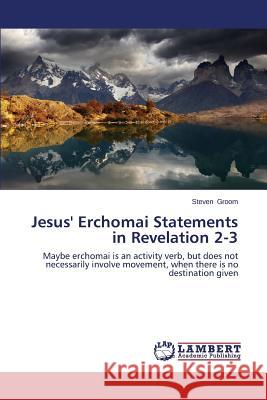Jesus' Erchomai Statements in Revelation 2-3 » książka
Jesus' Erchomai Statements in Revelation 2-3
ISBN-13: 9783659661266 / Angielski / Miękka / 2014 / 208 str.
This book looks into the meaning of Christ's ἔρχομαί statements in the book of Revelation, and specifically in Jesus' messages to the seven churches in Revelation 2:5, 16, and 3:11. To do that it has to evaluate the meaning of all uses of ἔρχομαί within the corpora of the NT. The verb was found to be aspectually vague, which had two implications. The first is that the Bible authors were able to use the verb in all of the three aspects, as well as a fourth, figurative aspect found in the apostle John's writings. The second implication was that the NT authors were able to separate the verb from the stated main event as described in the deixis. It was also found that each of the NT authors had their own preference as to the frequency, and also as to which aspect they preferred to use the Greek verb, ἔρχομαί. The Apostle John gave preference to using ἔρχομαί more than any other NT author of which the implications will be explored as to John's use of ἔρχομαί in Revelation.
This book looks into the meaning of Christs ἔρχομαί statements in the book of Revelation, and specifically in Jesus messages to the seven churches in Revelation 2:5, 16, and 3:11. To do that it has to evaluate the meaning of all uses of ἔρχομαί within the corpora of the NT. The verb was found to be aspectually vague, which had two implications. The first is that the Bible authors were able to use the verb in all of the three aspects, as well as a fourth, figurative aspect found in the apostle Johns writings. The second implication was that the NT authors were able to separate the verb from the stated main event as described in the deixis. It was also found that each of the NT authors had their own preference as to the frequency, and also as to which aspect they preferred to use the Greek verb, ἔρχομαί. The Apostle John gave preference to using ἔρχομαί more than any other NT author of which the implications will be explored as to Johns use of ἔρχομαί in Revelation.











